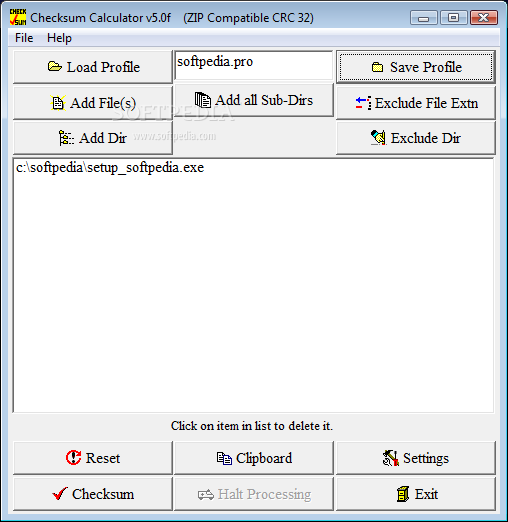

Warning - Creating checksum for a device!.One of the file names points to a directory, not a regular file. This option can not be used by the chksum program. The encoding mechanism must be '' HEX '', '' ASCII-85 '' or ''R-ASCII-85''.Ī long option including the argument must not exceed 1024 characters. needs an argument!Īn argument (digest type or encoding mechanism is needed by the long option. 8 The message digest is not supported here.5 The stat() function failed for a file.4 Attempt to handle an illegal/unknown file type.The program sets the exit status as follows: Indicates that the check lists were produced by md5sum, not chksum. The exit status indicates whether or not there were failed tests. Suppresses messages about succeeded tests and failed tests in check mode. Suppresses informational messages about succeeded tests in check mode. The files specified on the command line (or standard input if no file name is specified) contain checksum lists produced formerly by If this option is not used the first output line is a control line indicating the message digest type and the

Turns off header line printing in build mode. Indicates that the files specified on the command line are lists of file names instead of files to build checksums directly (in build mode only). The abbreviations A85 and R-ASCII-85 or RA85 can be used instead of ASCII-85 and REVERSE-ASCII-85. Long option: -message-digest= digest -e encoding selects an encoding mechanism to convert binary data to text, one from: HEX (to choose ASCII-Hex encoding), ASCII-85 (toĬhoose ASCII-85 encoding) or REVERSE-ASCII-85 (to choose reverse ASCII-85 encoding). SHA-1 is the default message digest algorithm. m digest chooses a message digest algorithm, one from: MD5, RIPEMD-160, SHA-1, SHA-224 , The chksum program builds checksums for files (build mode) and compares file checksums against a checksum list (check mode).Ī binary message digest is created using one of the following algorithms: MD5, RIPEMD-160, SHA-1 (default),Ī text representation of the message data is created using one of the following encodings: ASCII-Hex, ASCII-85 (default) or reverse


 0 kommentar(er)
0 kommentar(er)
